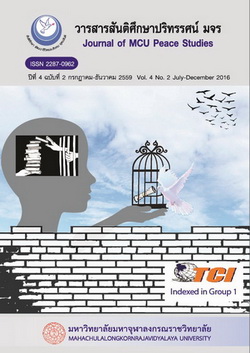Buddhism and Postmodernity as the Path of Autonomy Leading to Mutual Understanding and Peace
Main Article Content
บทคัดย่อ
This paper is intended to investigate some teachings in Buddhism encouraging human beings to achieve mutual understanding and peace through the view of postmodernity and vice versa. However, this paper is not willing to propose the claim that Buddhism is superior than others but just wants to insist that in any fields of discussion religion can meet. Furthermore, this paper is not comparative religious study. It seems that both Buddhism and philosophy concern in different discussion. In some aspects, no matter whether Buddhism serves as religious task, both Buddhism and philosophy share the same dimension in the sense of emancipation of human beings. In order to achieve this objective, this paper will investigate the content of Kālāma Sutta how the Buddha provided such attitude and how it becomes the inquiry of knowledge leading to the mutual understanding and peace.
The second objective of this paper is to explore in details the thought of the philosopher whose works are foundational to postmodernism. The expectation of this paper is to achieve more right understanding the attitude of Buddhism towards the inquiry of knowledge that leads to support the claim that Buddhism and postmodernity is not obsolete but release human beings from dominant mainstream of claims, for example science, in the present time. It probably can be said that both were the postparadigms of thought. The second expectation of this paper is to point out that the attitude of postmodernity can be found in any philosophical paradigms and postmodern [challenging towards fundamentalism] begets progress of living believes. The most important expectation of this paper is to support that the questioning against the ten legitimacies in Kālāma Sutta and the concept of Kantian Enlightenment can be applied in encouraging autonomous reason and making the world peace.
This paper is divided into two sections: (1) The general background of discussion in the problem of legitimacy and (2) The Buddhist Perspective on Autonomy of Individual. In order to go on discussion, it is necessary to investigate its origin.
The second objective of this paper is to explore in details the thought of the philosopher whose works are foundational to postmodernism. The expectation of this paper is to achieve more right understanding the attitude of Buddhism towards the inquiry of knowledge that leads to support the claim that Buddhism and postmodernity is not obsolete but release human beings from dominant mainstream of claims, for example science, in the present time. It probably can be said that both were the postparadigms of thought. The second expectation of this paper is to point out that the attitude of postmodernity can be found in any philosophical paradigms and postmodern [challenging towards fundamentalism] begets progress of living believes. The most important expectation of this paper is to support that the questioning against the ten legitimacies in Kālāma Sutta and the concept of Kantian Enlightenment can be applied in encouraging autonomous reason and making the world peace.
This paper is divided into two sections: (1) The general background of discussion in the problem of legitimacy and (2) The Buddhist Perspective on Autonomy of Individual. In order to go on discussion, it is necessary to investigate its origin.
Article Details
รูปแบบการอ้างอิง
Kaewpetch, U. (2016). Buddhism and Postmodernity as the Path of Autonomy Leading to Mutual Understanding and Peace. วารสารสันติศึกษาปริทรรศน์ มจร, 4(2), 295–312. สืบค้น จาก https://so03.tci-thaijo.org/index.php/journal-peace/article/view/76797
ประเภทบทความ
บทความวิชาการ
ทัศนะและความคิดเห็นที่ปรากฏในบทความในวารสาร ถือเป็นความรับผิดชอบของผู้เขียนบทความนั้น และไม่ถือเป็นทัศนะและความรับผิดชอบของกองบรรณาธิการ ยินยอมว่าบทความเป็นลิขสิทธิ์ของวารสาร


